
Euthalia aconthea, the common baron, often called simply baron, is a medium-sized nymphalid butterfly native to Sri Lanka, India and southeast Asia. It flies with stiff wing beats and often glides. The wing is not flapped very far below the horizontal.

Athyma selenophora, the staff sergeant, is a species of nymphalid butterfly found in tropical and subtropical Asia.
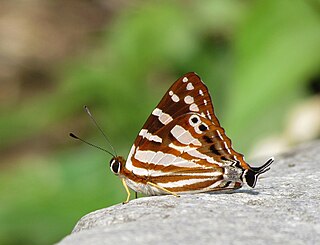
Dodona egeon, the orange Punch, is a small but striking butterfly found in the Indomalayan realm - in Mussoorie to Assam, Burma (nominate) and Peninsular Malaya that belongs to the family Riodinidae.

Dodona ouida, the mixed Punch, is a small but striking butterfly found in the Indomalayan realm in West China, Himalayas, Northeast India (hills) and Burma that belongs to the Punches and Judies, that is, the family Riodinidae.
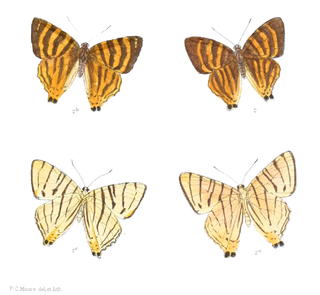
Dodona adonira, the striped Punch, is a small but striking butterfly found in the Indomalayan realm that belongs to the Punches and Judies, that is, the family Riodinidae.

Charaxes marmax, the yellow rajah, is a butterfly found in India that belongs to the rajahs and nawabs group, that is, the Charaxinae group of the brush-footed butterflies family.
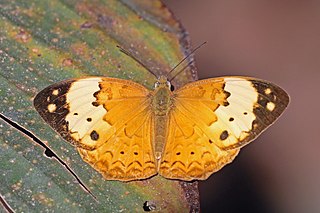
Cupha erymanthis, the rustic, is a species of brush-footed butterfly found in forested areas of tropical South Asia and Southeast Asia. The males and females are identical.

Mycalesis mineus, the dark-brand bush brown, is a species of satyrine butterfly found in Asia.
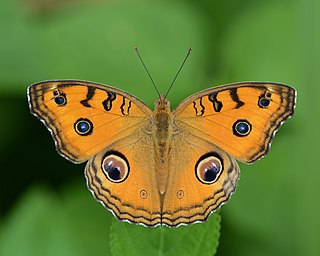
Junonia almana, the peacock pansy, is a species of nymphalid butterfly found in Cambodia and South Asia. It exists in two distinct adult forms, which differ chiefly in the patterns on the underside of the wings; the dry-season form has few markings, while the wet-season form has additional eyespots and lines. It is listed as Least Concern in the IUCN Red List.
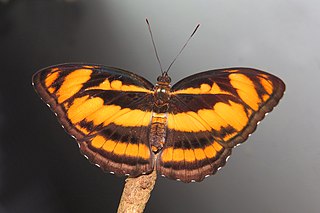
Athyma nefte, the colour sergeant, is a species of brush-footed butterfly found in tropical South and Southeast Asia.

Athyma zeroca, the small staff sergeant, is a species of nymphalid butterfly found in tropical and subtropical Asia.
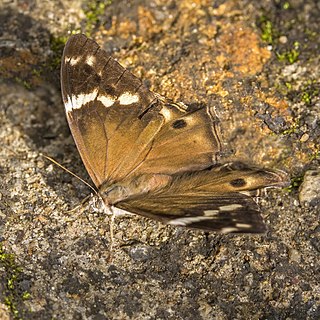
Lethe drypetis, the Tamil treebrown, is a species of Satyrinae butterfly found in south India and Sri Lanka.

Vindula erota, the common cruiser, is a species of nymphalid butterfly found in forested areas of tropical South Asia and Southeast Asia.
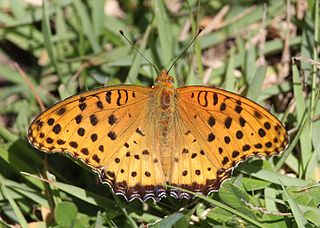
The Indian fritillary is a species of butterfly of the nymphalid or brush-footed family. It is usually found from south and southeast Asia to Australia.

Pantoporia hordonia, the common lascar, is a species of nymphalid butterfly found in Cambodia, tropical and subtropical Asia.

Stichophthalma camadeva, the northern jungle queen, is a butterfly found in South Asia that belongs to the Morphinae subfamily of the brush-footed butterflies family.

Stichophthalma nourmahal, is a South Asian butterfly that belongs to the Morphinae subfamily of the brush-footed butterflies family.

Lethe confusa, the banded treebrown, is a species of butterfly belonging to the satyr family that is found mainly in Southeast Asia and in parts of South Asia.

Catochrysops strabo, the forget-me-not, is a small butterfly found in Asia that belongs to the lycaenids or blues family. The species was first described by Johan Christian Fabricius in 1793. It is found in Sri Lanka, India, from Sikkim to Indochina and in Sundaland, Sulawesi and the Philippines.

Junonia iphita, the chocolate pansy or chocolate soldier, is a butterfly found in Asia.






















